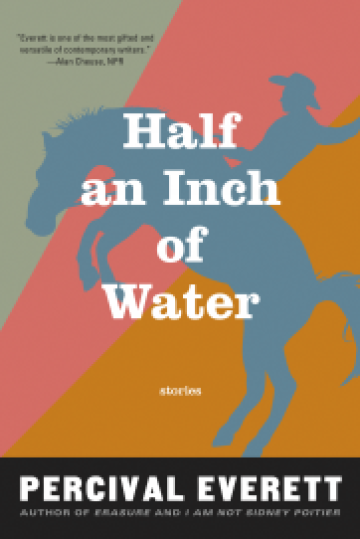HALF AN INCH OF WATER by Percival Everett
Nearly all of the characters featured in Percival Everett's new short story collection, Half an Inch of Water are in various states of emotional or psychological agitation. They cannot be still inside of any single moment for very long. The nine stories in this new collection all take place, as is usually the case for Everett's fiction, in the American West of today. This West is not mythologized and looks nothing like the Hollywood West of John Ford and John Wayne. Though rather than replace this version with a gritty and overly harshened Real West, Everett colors his fictional landscape with the objectivity and indifference of Nature. Here in Everett's world, Nature often permeates tales most explicitly through the presence of horses.
Everett's horses serve as a neutral manifestation of his characters' moral consciences. These horses see all and know all, but they do not intervene and they do not comment on their riders' actions or words, however ludicrous they might be. Nature, here in the form of the horse, is God – laconic but eternally existing and generous in its spiritual energy. As it was in the Western yore of old, here the horse is the cowboy's right-hand man, and the animal is more reliable to get him out of a jam than a fellow human being – with all of his emotional and psychological Strum und Drang – might be.
In “A High Lake”, the aging Norma takes to her horse every day to maintain her connection to the physical world, even though it is against her doctor's wishes. Often elements of the background scenery rather than the foreground of plot, Everett's horses are noble and steadfast and not anthropomorphized in any way. While linked to their human riders, the horses stand apart and firmly so as their own species. The fact that Everett's characters are accompanied by their horses through most scenes seem to highlight their moral ties to the universe in which they take part; they are held accountable to the laws of man and of Nature.
When left entirely alone, humans tend to run amok. Even with these demands of responsibility that Everett makes of his characters, the characters also adopt a bit of the same neutrality that Nature does. They seem, by the time the reader meets them that is, to have accepted the basic conditions of life - the hard and soft, the clear and ambiguous. This does not mean that they are content with the conditions; at times throughout their stories, they do take issue. Everett is an African American writer and his characters are frequently represented as such; yet, the issue of race is not given an excess of heightened attention.
Though people of color seem to be rarer in the rural Western communities of Everett's stories, this fact of identity is simply what it is – and Everett chooses more subtle themes to deal with and to delve into. The majority of the characters in these nine stories are dealing with traumas of some sort, whether it be one that occurred long ago or one that happens over the course of their individual story. It is these traumas that, more than often than not, serve as the sources of characters' agitations.
In “Stonefly”, young Daniel works on processing his sister's death that still haunts his household and his own actions. It is nature that serves as his path back to joy and connection to life. Disturbing events that occur seemingly out of the blue in our lives usually lead us to go on soul searches of varying lengths: “I've always believed myself to be this person – but what if it turns out that I'm actually that person instead?”
Everett articulates this recurring thematic journey quite well. The strong presence of Nature that colors each of these nine stories is accented by its intersection with Native American culture and its role in the mythology of the West. It is frequently a Native American energy here that stands as the source of magic, mysticism, or the unexplained.
In “Little Faith”, Sam is the town veterinarian who goes forth to try and locate a missing deaf Native American girl in the local community. Along the way, he is confronted with obstacles of Nature, yet is ultimately redeemed by his dead friend's connection to them in a mystical way. The Native Americans' relationship with Nature garners attention from Everett here; the intensity of their connection to it is heightened and shades their character experiences. Nature is powerful and majestic and we must bow to its laws – both those of the physical Mother Earth and those of our own inherent personal natures, which encapsulate far more than what is suggested by our physical bodies.
Though Everett gains clout through his realistic approach to these stories, he loses a bit of the enticing glitter that is typically to be found in the American Western genre. A few of his stories border on lackluster in effect, unable to manifest enough sufficient drama that fiction readers tend to demand. There is a touch of Hemingway's stark fact-driven voice here, but with a bit less intensity, which is perhaps more akin to the world of 2015. Percival Everett proves himself to be an eternally modern author.
Percival Everett is Distinguished Professor of English at the University of Southern California and the author of nearly thirty books, including Percival Everett by Virgil Russell, Assumption, Erasure, I Am Not Sidney Poitier, and Glyph. He is the recipient of the Academy Award from the American Academy of Arts and Letters, the Hurston/Wright Legacy Award, the Believer Book Award, and the 2006 PEN USA Center Award for Fiction. He has fly-fished the West for over thirty years. He lives in Los Angeles.

 Jude Warne earned her MA degree in 2015 from NYU's Draper Program of Humanities and Social Thought. Her Master's Thesis, "Let the Broken Hearts Stand", focused on American characters dealing with disappointment in the works of Bruce Springsteen and Sherwood Anderson. Jude earned her BA in Cinema Studies and Art History from NYU in 2011. She has written numerous reviews for Senses of Cinema, Film Matters, Journal of Popular Music & Society and Scope. She is also the music columnist at Red Paint Hill, an In-the-Field correspondent at Film International, a jazz critic at CMUSE and a contributing writer at Live for Live Music and The Vinyl District.
Jude Warne earned her MA degree in 2015 from NYU's Draper Program of Humanities and Social Thought. Her Master's Thesis, "Let the Broken Hearts Stand", focused on American characters dealing with disappointment in the works of Bruce Springsteen and Sherwood Anderson. Jude earned her BA in Cinema Studies and Art History from NYU in 2011. She has written numerous reviews for Senses of Cinema, Film Matters, Journal of Popular Music & Society and Scope. She is also the music columnist at Red Paint Hill, an In-the-Field correspondent at Film International, a jazz critic at CMUSE and a contributing writer at Live for Live Music and The Vinyl District.